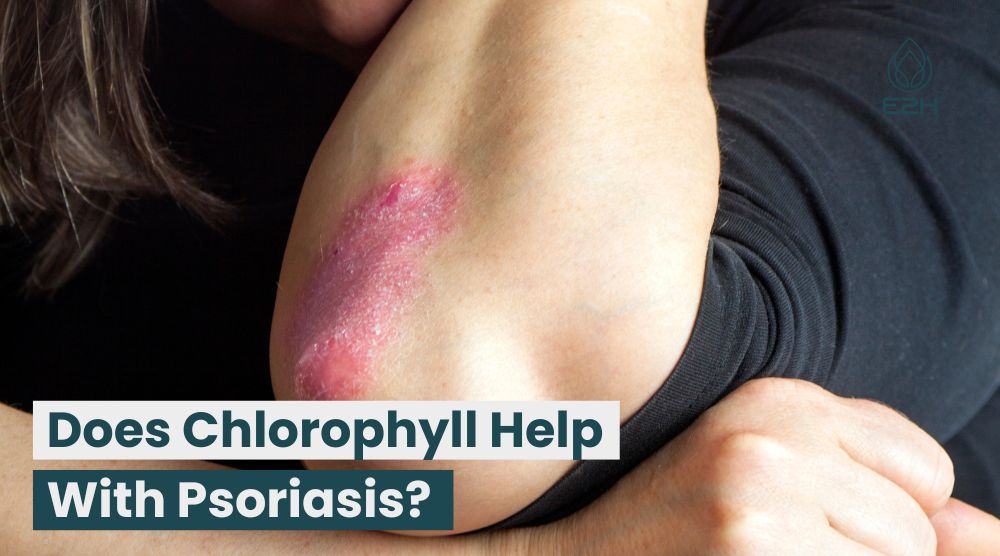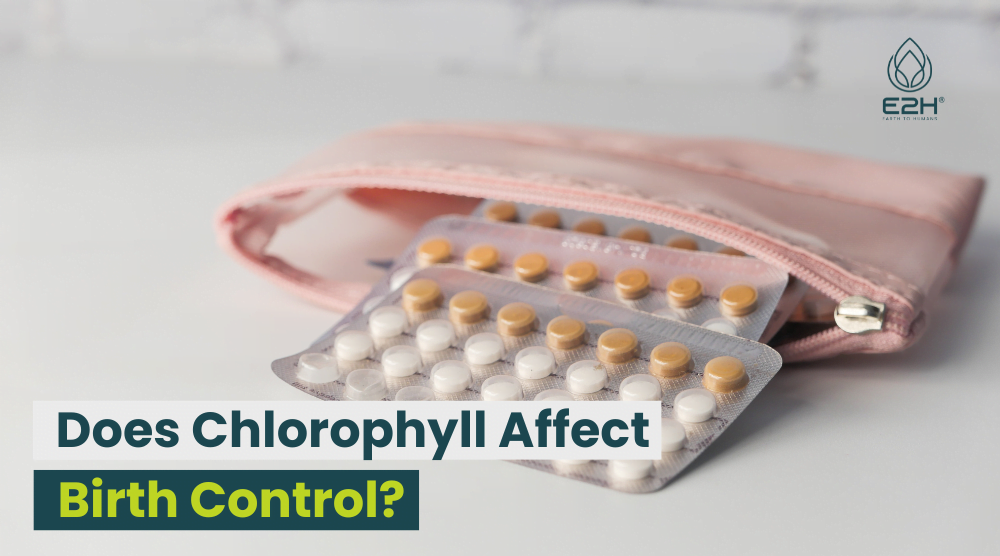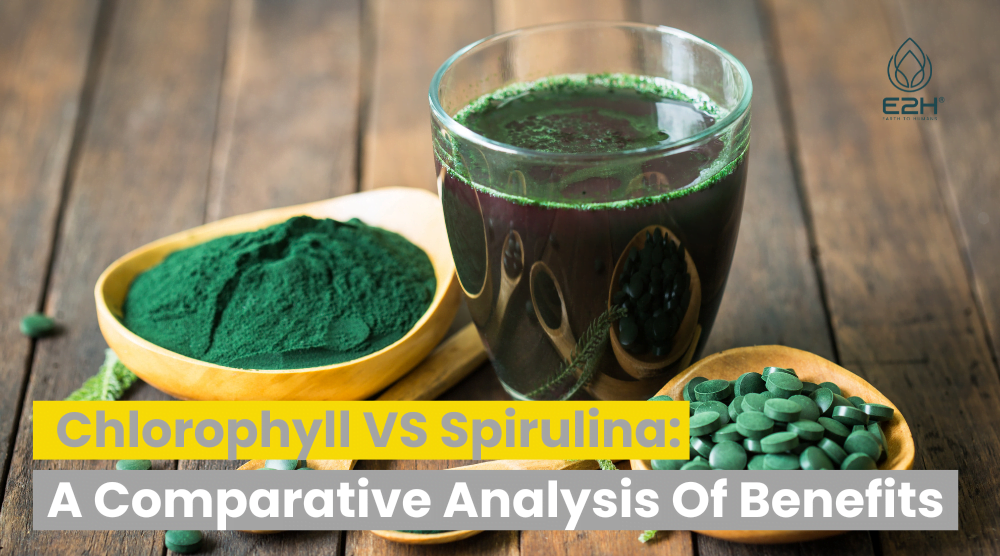Does Chlorophyll Help With Psoriasis: There is limited scientific evidence to support the effectiveness of chlorophyll for psoriasis. However, its anti-inflammatory and antioxidant properties may make it a potentially helpful dietary supplement used for managing symptoms.
What is Psoriasis?
Psoriasis is a chronic autoimmune skin condition that speeds up the growth cycle of skin cells. This results in patches of red, scaly, and itchy skin that can appear on various parts of the body. The exact cause of psoriasis is not fully understood.
What is Chlorophyll?
Chlorophyll is a green pigment found in plants that this green pigment plays a crucial role in plants and in photosynthesis. It absorbs light energy from the sun and converts it into chemical energy. Chlorophyll is also available in vitamin and supplement form and is commonly used for its potential health benefits as antioxidants.
Does chlorophyll help with psoriasis?
There is limited scientific evidence to support the effectiveness of chlorophyll for psoriasis. However, some studies suggest that chlorophyll’s anti-inflammatory and antioxidant properties may make it a potentially helpful supplement for managing psoriasis symptoms. Chlorophyll supplements are available in capsule, liquid, and powder form.

It is important to note that the safety and effectiveness of chlorophyll supplements have not been thoroughly studied, and they may interact with certain medications. It is always a good idea to talk to your healthcare provider before starting any new supplements. Increasing green leafy vegetable intake is also a natural way to increase chlorophyll intake.
The Link between Chlorophyll and Psoriasis
While the link between chlorophyll and psoriasis is not fully understood, some research suggests that chlorophyll’s anti-inflammatory and antioxidant properties may help manage psoriasis symptoms. These properties may help reduce inflammation and oxidative stress, which are both key factors in the development and progression of psoriasis.
However, more research is needed to fully understand the potential benefits of chlorophyll for psoriasis and to determine safe and effective dosages. Additionally, chlorophyll supplements should not be used as a substitute for medical treatment, and it is important to speak with a healthcare provider before starting any new or remember chlorophyll supplements.
How to Use Chlorophyll for Psoriasis?
Chlorophyll can be used for psoriasis in supplement form or by increasing green leafy vegetable intake. Chlorophyll supplements are available in capsule, liquid, and powder form, and dosages vary based on the specific product. It is important to talk to a healthcare provider before starting any new supplements, especially if you are taking medication.
Increasing green leafy vegetable intake is a natural way to increase blood chlorophyll intake, and it is recommended that people with psoriasis consume at least 2-3 servings of green vegetables daily. Topical chlorophyll creams liquid drops or ointments may also be available, but their effectiveness has not been thoroughly studied.
What are the benefits of liquid chlorophyll?
Liquid chlorophyll is a concentrated form of chlorophyll that is easy to consume and quickly absorbed by the body. It is believed to have a range of health benefits, including detoxifying the body, improving digestion, boosting the immune system, and increasing energy levels. However, the scientific evidence supporting these claims is limited, and more research is needed to fully understand the potential benefits of liquid chlorophyll. As with any supplement, it is important to talk to a healthcare provider before starting to use liquid chlorophyll.
What is the best way to incorporate a chlorophyll supplement in a daily routine?
The best way to incorporate a chlorophyll supplement into a daily routine is to follow the dosage instructions provided on the product label. Chlorophyll supplements are available in capsule, liquid, and powder form, and the dosages can vary based on the specific product. It is recommended to take the supplement with food or as directed by a healthcare provider.

It is also important to remember that blood chlorophyll supplements should not be used as a substitute for medical treatment, and it is important to speak with a healthcare provider before starting any new supplements. Additionally, increasing green leafy vegetable intake is a natural way to increase blood chlorophyll intake and can be easily incorporated into a daily routine.
Does chlorophyll help with skin inflammation?
Chlorophyll has been shown to have anti-inflammatory properties, which may help reduce skin inflammation. Studies have found that chlorophyll can help reduce inflammation in various parts of the body, including the skin. Inflammation is a key factor in the development and progression of many skin conditions, including psoriasis.
However, more research is needed to fully understand the potential benefits of chlorophyll for skin inflammation, and the dosages and forms of liquid chlorophyll used that are most effective. Additionally, liquid chlorophyll supplements should not be used as a substitute for medical treatment, and it is important to speak with a healthcare provider before starting any new or liquid chlorophyll supplements.
Can drinking chlorophyll help with eczema?
There is limited scientific evidence to support the use of chlorophyll for eczema. While chlorophyll’s anti-inflammatory properties may help manage eczema symptoms, more research is needed to understand its effectiveness. It is important to note that eczema is a chronic condition that requires ongoing medical treatment.
While increasing green leafy vegetable intake or taking chlorophyll supplements may be a healthy addition to a well-rounded diet, they should not be used as a substitute for medical treatment. It is always important to speak with a healthcare provider before starting any new supplements or making changes to your treatment plan.
Are there any specific green vegetables that should be avoided for people with psoriasis?
There are no specific green vegetables or foods that should be avoided for people with psoriasis, as all green vegetables are generally considered to be healthy and beneficial for overall health. However, some people with psoriasis may find that eating certain foods, including some vegetables and fruits, can trigger flare-ups or worsen their symptoms. Keeping a food diary can help identify any potential triggers. Additionally, it is important to maintain a balanced and varied diet, and to talk to a healthcare provider or registered dietitian before making any major changes to your diet.
Some examples to get natural chlorophyll
There are many natural sources of chlorophyll that can be easily incorporated into a healthy diet. Green leafy vegetables such as spinach, kale, and collard greens are all excellent sources of chlorophyll. Other vegetables such as broccoli, asparagus, and green beans also contain chlorophyll.

Additionally, herbs such as parsley, cilantro, and mint are rich in natural chlorophyll too. Chlorophyll can also be found in spirulina and chlorella, which are types of blue-green algae. Increasing your intake of sunlight and eating these natural sources of chlorophyll can provide many health benefits and may help improve skin conditions such as psoriasis.
8 Foods That Affect Psoriasis
FAQs
Is chlorophyll safe for people with psoriasis?
While chlorophyll is generally considered safe, it may interact with certain medications and should be used with caution. It is always a good idea to talk to your healthcare provider before starting any new supplements.
Can chlorophyll cure psoriasis?
There is currently no cure for psoriasis, no added benefit and more research is needed to determine whether taking chlorophyllin is an effective treatment for psoriasis.
Can chlorophyll help with other skin conditions?
Chlorophyll has been studied for its potential health benefits, including anti-inflammatory and antioxidant properties, which may make it useful for managing other skin conditions. However, more research is needed to determine its effectiveness.
Conclusion
While the research on the effectiveness of chlorophyll for psoriasis is limited, its potential anti-inflammatory and potent antioxidant properties make it a promising supplement to consider for managing symptoms. However, it is important to talk to your healthcare provider before starting any new supplements or treatments.














